Architecture Graduate Finds Sustainable Career Path

Sowdamini Ponnada, MS’25, sustainable building systems, leveraged Northeastern’s experiential learning opportunities and comprehensive curriculum to transform her passion for sustainability into a technical skill she could utilize in her architecture career. Upon graduation, she is joining her co-op employer full-time as an early career sustainability consultant.
Sowdamini Ponnada, MS’25, sustainable building systems, came to Northeastern University with a clear goal to bridge the gap between her architectural education and the skills required to be a sustainable professional in the field.
She leveraged Northeastern’s experiential learning opportunities and comprehensive curriculum to transform her passion for sustainability into a technical skill she could utilize in her architecture career. With teaching assistant positions, industry experience, and student leadership, Ponnada established herself as a sustainability professional focused on creating a positive environmental impact through the built environment.
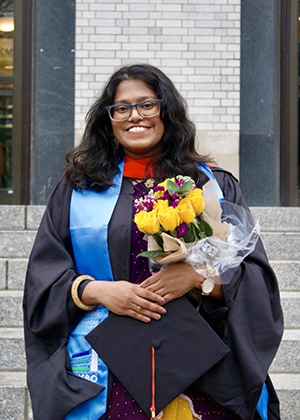
Northeastern University’s master’s program, Sustainable Building Systems, provided Ponnada with opportunities to grow as a sustainable architect.
“Buildings are one of the largest contributors to climate change. When I was pursuing architecture, it felt like there was a lot I could do with buildings—they can be much more than just a place where you can live or work. They can be beautiful and sustainable,” says Ponnada.
Curriculum and teaching assistant position hone technical skills
Ponnada chose the sustainable building systems program because it addresses the technical aspects of measuring sustainability rather than treating it as theory. The curriculum covers passive design, energy modeling, life cycle assessment, and other quantitative and qualitative approaches to sustainable building design.
David Fannon, associate professor of architecture and civil and environmental engineering, transformed her approach to sustainable design: sustainability as a practice requiring critical thinking and intentional choices. Ponnada says, “his [Fannon] class was eye-opening, and I’ve carried his lessons from my first semester with me throughout my career. He taught me to think critically about every choice when designing a building. I now understand how necessary it is to balance competing needs, like energy efficiency and natural lighting.”
Ponnada gained a deeper technical understanding as a teaching assistant for Fannon’s graduate course and one undergraduate course taught by Kathryn Grahame, teaching professor and associate director of first-year engineering. Attending Fannon’s classes again, a year after taking them as an adjusting international student, allowed her to grasp concepts she had initially missed while adapting to life in Boston. Explaining those concepts, both fundamental and advanced, to other students cemented the information in her mind.
Another influential professor was Christopher Schaffner, part-time lecturer and founder of The Green Engineer, Inc. Schaffner taught her how to quantify the environmental impact of a building by evaluating its HVAC systems and conducting building performance simulations. Beyond his classroom lessons, Schaffner encouraged Ponnada to attend events hosted by Built Environment Plus—an organization a part of the U.S. Green Building Council—providing her the opportunity to network with industry professionals.
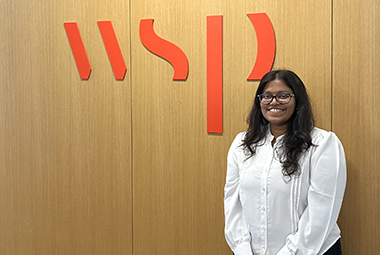 |
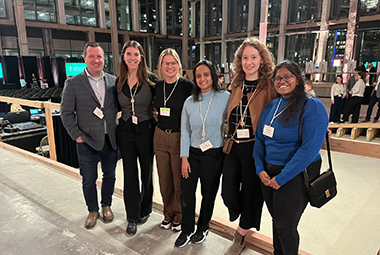 |
Ponnada experienced firsthand how policy can have a meaningful impact on sustainability in the built environment during her internship at WSP.
“He really prioritized helping his students network and make connections in the industry,” says Ponnada. “He even recommended me for my summer internship at WSP—a professional services consulting firm—where I worked on an ASHRAE-compliant energy model in eQuest, supported LEED and Boston Article 37 compliance, and wrote up reports on energy models and Whole Building LCA.”
Summer internship results in award and full-time position
During her three-month internship with the built ecology team at WSP, Ponnada worked on projects where she directly applied the technical skills she developed in class. “It was an amazing experience; I got the chance to use the information I learned from classes to solve real-world problems. People there were also really supportive, and they would encourage me to take on new projects to learn new skills,” says Ponnada.
She learned first-hand the interplay between policy and practice in sustainable building design. The projects she worked on needed to comply with Boston’s climate resilience guidelines; she saw how policy and lawmakers work alongside consultants and architects to drive industry change.
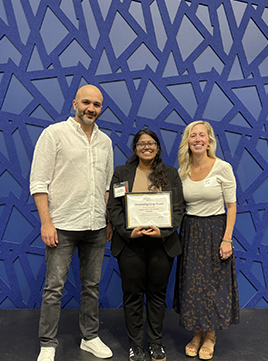
Ponnada’s exceptional work during her internship at WSP won her a 2025 Outstanding Co-op Award. She says her manager (left) and co-op advisor, Nora Salmon (right) were instrumental in her success.
“It made me understand how changes at the policy level, at the city level, and also statewide can make positive impacts in the industry. It’s not just coming from consultants, but also from the lawmakers who value sustainability,” Ponnada says.
Ponnada was recognized with a 2025 Outstanding Co-op Award from the College of Engineering for her performance and professional growth during her internship. After her successful internship, Ponnada was offered a full-time position as an early career sustainability consultant, which she will begin in July 2025. She is looking forward to staying in Boston and gaining experience in various projects.
“I don’t want to pigeonhole myself at the beginning of my career. I want to work on different projects, like energy modeling, LCA, or doing LEED certifications, to see which is truly my calling. With experience in different industry concentrations, I’ll have the qualifications to pursue any job in the future,” Ponnada says.
Student leadership builds community
Throughout her Northeastern career, Ponnada was an active member and eventually the co-president of NUSBO—Northeastern University Sustainable Building Organization. She initially joined because of the club’s goal of creating a community where students could connect with each other and industry professionals to learn from their experiences. They host a weekly seminar series, inviting distinguished professionals to speak and participate in their weekly student meetings, which are available to all sustainable building systems students.
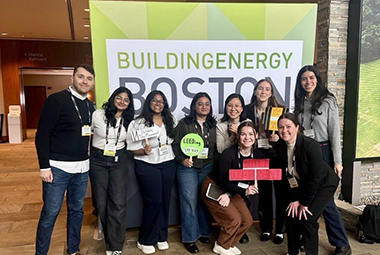 |
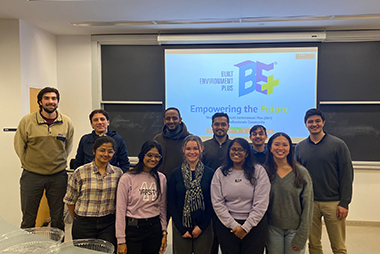 |
NUSBO became a space for Ponnada to make connections with other students and industry partners, while also developing her leadership skills.
The weekly student-led meetings became more than professional development sessions; Ponnada made lasting friendships and connections across different cohorts. Wanting to help new students navigate the program and make informed career decisions, Ponnada decided to run for co-president in her final semester.
“It was a great opportunity for me to build my people skills. NUSBO was a great way for me to step out of my comfort zone and meet more people in the program while also gaining leadership skills,” Ponnada says.
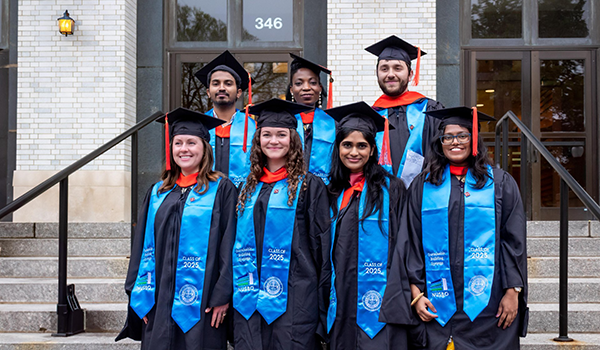
The support Ponnada received from her fellow NUSBO members (pictured above) and her professors helped her succeed in the program, on co-op, and as a student leader.
The sustainable building systems program allowed Ponnada to create a community of people at different stages in their careers. She transformed her passion for sustainability into technical industry skills that will serve her throughout her professional career.
“The program helped me broaden my perspective. I learned so much from different people and from my own experiences. With this knowledge, I can examine a problem from multiple perspectives to find a solution that is both sustainable and practical,” Ponnada explains.